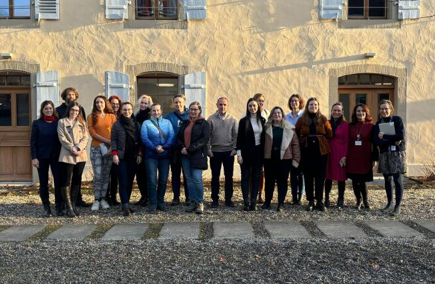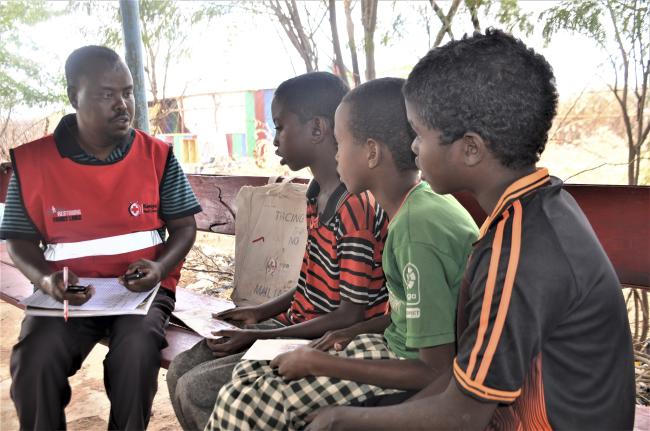Russia-Ukraine: Red Cross and Red Crescent partners in 60 countries to support families of missing persons

From Nepal to Poland, from New Zealand to Ecuador, Red Cross and Red Crescent societies and ICRC delegations work hand in hand to ensure that families looking for their loved ones have someone to turn to, wherever they may be in the world. With one objective in mind: providing them with answers as soon as possible. (photo copyright Ed Ram for Guardian / Eyevine/ Dukas)
The armed conflict between Russia and Ukraine has shattered tens of thousands of families, destroying their livelihoods, tearing them apart or leaving them in constant anguish not knowing what happened to their loved ones. At the end of May 2024, some 28,000 persons were sought for, and this number is increasing at the rate of around 1000 new cases a month.
“Families are between hope and despair. The hope of seeing their loved ones return, and the distress caused by not knowing, by the fear and despair of not getting news. They wonder if they are dead or alive, if they are cold, hungry or in good health”, explains Dusan Vujasanin, head of the ICRC’s Central Tracing Agency (CTA) Bureau for the International Armed Conflict between the Russian Federation and Ukraine. This situation affects not only their close relatives, but also their friends, colleagues, and the whole community of which they were once a part.
A unique network of partners
Most of the requests to search for a son, daughter, husband, mother, brother or sister come from Ukraine and Russia – with the Ukrainian and Russian Red Cross, as well as the ICRC delegations in the two countries, being at the forefront to support them. But families abroad anxiously looking for news have contacted the Red Cross or Red Crescent on every continent. Tracing requests have been collected from Poland to New Zealand, from Egypt to Ecuador, from Georgia to Nepal, mobilizing some 50 Red Cross and Red Crescent National Societies and around 25 ICRC delegations in more than 60 different countries.
“The Red Cross and Red Crescent Movement clearly demonstrates its strength and unique added value. Thanks to our global footprint and close cooperation, we are able to support families wherever they are, to ensure they have someone to turn to in the country where they live, whether permanently or temporarily”, notes Dusan Vujasanin. “This Family Links Network is also what enables us to be more efficient in the search for missing persons and, ultimately, contributes to alleviating the suffering of families.”
Cooperating with dozens of partners from different time zones, cultural environments and experience, and with unequal capacities, doesn’t go without challenges. “We all have our working methods, our processes, and methodologies”, acknowledges Anne Vallet, who leads the CTA bureau’s team in charge of relations with the Red Cross and Red Crescent National Societies. “That’s why it was crucial to harmonize our approach and tools from the onset to ensure we can assist families in the most efficient and best possible way. Aligning our communication with families and speaking with one voice was also important.”
A milestone for the future
The rapidly growing number of requests from families looking for their loved ones also imposed on all Red Cross and Red Crescent Movement components to adapt rapidly and take urgent action, including the recruitment of staff and volunteers, strengthening capacities, and ensuring Russian and Ukrainian families can be assisted in their own language. For some National Societies, who had never been confronted with such large-scale emergencies – or had not been for decades – the escalation of the armed conflict has brought drastic changes to their everyday work (see below). At the ICRC, it has led to the setting up of the CTA bureau, a structure dedicated to preventing disappearances and searching for missing persons.
“Specific challenges associated with a twenty-first century international armed conflict, which integrates all modern technological means and easy access to plethora of information, and the ongoing hostilities, with people who keep moving or being displaced, require to remain agile and adapt rapidly", notes Anne Vallet. Interacting with and supporting tens of thousands of people, many of whom have lost everything and had to relocate several times in search of safety, also brings its share of distress, post-traumatic stress, anxiety and sometimes anger to deal with.
“This experience inspires us all to surpass ourselves", confirms Anne Vallet. “The lessons we learn now will certainly influence our future actions”. And help further improve the Red Cross and Red Crescent Movement’s global response on behalf of the most vulnerable.
Interview with Katarzyna Kubicius
"The Polish Red Cross is a different organization today"
Katarzyna Kubicius, head of the Protecting Family Links team at the Polish Red Cross, explains how they responded to the influx of millions of people fleeing hostilities. With all the organizational, but also emotional challenges that came with it.

Within days of 24 February 2022, millions of people crossed the Polish-Ukrainian border. How did the Polish Red Cross adapt to this major emergency in such a short period of time?
The task and challenges were enormous. For example, we didn't have trained staff in other cities than Warsaw, the capital of Poland, who could take tracing requests from families looking for their loved ones. We also had to quickly conduct a needs assessment, which was something totally new to us. This helped us verify some of our assumptions, such as connectivity issues: fortunately, Polish mobile phone providers rose to the challenge and distributed free SIM cards to those who needed them.
With 47,000 people crossing the border daily at some point, we were also faced with an information challenge. How to reach out to them? We had to print leaflets with safety tips, helping people to maintain family links, get accommodation, etc. There was also a language barrier: most people in our team at the time did not speak Russian, let alone Ukrainian, and we had to address this rapidly.
How did you handle these new challenges emotionally?
There is a big difference between interviewing a family member of someone who disappeared during the Second World War, and someone, who just lost contact with a loved one. We had to talk with mothers, fathers, wives, husbands, sons and daughters – not with grandchildren and people, who barely, if at all, knew their relative.
Such a psychological challenge took a toll on the team. Since then, we have received huge help from the newly created Polish Red Cross Mental Health Psychosocial Support team. We now have a psychologist we can turn to in case of need, and we also have psychologists working for our phone line for Ukrainians.
What are the lessons learned from the last two years?
Before, our contacts with family members looking for loved ones were mainly by mail and phone. We didn't have people sitting in front of us, reliving their tragedies and going through a variety of emotional states. We are not made from stone: having people breaking down in front of us affected our staff. And you can either help that person, or make it worse. We learned how to talk to beneficiaries, so as not to worsen the situation and guide them through these terrible times. Now, with experience and new tools, we handle such situations better.
How will this experience influence Polish Red Cross’ work in the future?
The past two years' experience had an impact on the Polish Red Cross as a whole. We are a different organization, with new procedures, new tools and new equipment. Our Restoring Family Links activities are better known, at local and national levels. Our auxiliary role has also become more visible. Theory came into practice, in an extraordinary period and in extraordinary circumstances. Now, the Polish Red Cross is a respected and recognized partner nationwide.
Honestly speaking, we were not ready for such an emergency in the very beginning. This took us some time to mend. I also wish I had been able to support my colleagues who went through burn-out better. Here as well we were not ready and did not have the necessary tools to spot it in time and react in an appropriate manner. We learned it the hard way, but we are now much better equipped to help people, regardless of their nationality, religion or opinion.




